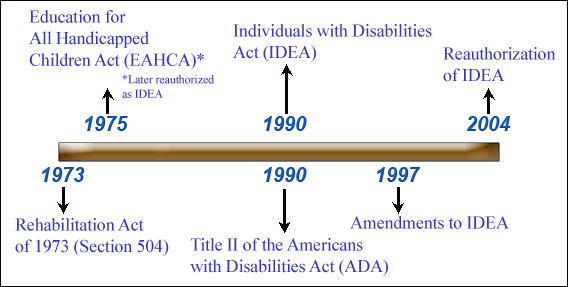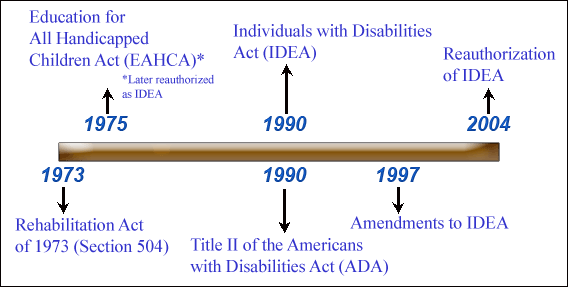What are Mr. Logan’s roles and responsibilities, and what types of services should he provide in a school setting?
Page 3: Section 504 Plans and Individualized Education Programs
 A student with special healthcare needs usually has either a Section 504 plan or an individualized education program (IEP). These documents are designed to ensure that students receive services appropriate to their individual needs. School nurses participate as part of the school team to develop these plans for students with special healthcare needs. School nurses may want to educate themselves about the laws related to students’ educational needs. The timeline below highlights such legislation. Following the timeline, more information on Section 504 plans and IEPs is provided.
A student with special healthcare needs usually has either a Section 504 plan or an individualized education program (IEP). These documents are designed to ensure that students receive services appropriate to their individual needs. School nurses participate as part of the school team to develop these plans for students with special healthcare needs. School nurses may want to educate themselves about the laws related to students’ educational needs. The timeline below highlights such legislation. Following the timeline, more information on Section 504 plans and IEPs is provided.
For Your Information
 School-based services for students with disabilities are continually improving, in part due to the effect of federal legislation. Click here or on the timeline to the right to learn more about the federal legislation that has had a significant impact on services for students with disabilities.
School-based services for students with disabilities are continually improving, in part due to the effect of federal legislation. Click here or on the timeline to the right to learn more about the federal legislation that has had a significant impact on services for students with disabilities.
Federal Legislation Timeline

| Legislation | Significance |
| Rehabilitation Act of 1973 (Section 504) | A civil rights act for people with disabilities, it guarantees that they are not discriminated against or excluded from any program or activity receiving federal funds. |
| Education for All Handicapped Children Act (EAHCA)*, 1975
*Later reauthorized as IDEA |
This act ensures that all students with disabilities have a federal right to “a free and appropriate public education.” It also mandates that students with disabilities receive “related services” necessary for them to be educated in the least-restrictive environment. |
| Individuals with Disabilities Act (IDEA), 1990 | This act was formerly entitled the Education for All Handicapped Children Act. It continues to ensure the rights provided in EAHCA, but revisions to the act have added special education categories for traumatic brain injury and autism. |
| Title II of the Americans with Disabilities Act (ADA), 1990 | ADA builds on the Rehabilitation Act of 1973. This legislation guarantees people who have disabilities better access to buildings, public transportation, and communication. |
| Amendments to IDEA, 1997 | Among the changes in IDEA, 1997, are the inclusion of ADHD within the “other health impairments” category, a provision for the participation of students with disabilities in standardized assessments, the inclusion of students with disabilities in the general education classroom, and guidelines about discipline regarding students with disabilities. |
| Reauthorization of IDEA, 2004 | The 2004 reauthorization of IDEA includes several addendums regarding personnel qualifications, assessments, and IEPs. School nursing is included as a related service. This means that school nurses can be listed as related service providers in IEPs and that school districts are eligible for state, federal, and third-party reimbursements for these services. |
(Close this panel)
Section 504 Plan
A Section 504 plan is a document that outlines the needs of a student who has a physical or mental impairment, so that he or she may participate successfully in the educational environment. This plan specifies the accommodations and modifications necessary for a student to be included in all aspects of his or her school and related activities. Eligibility does not require that the student receive special education services but does require that the student have an impairment that substantially limits a major life activity, such as:
Law: Section 504 of the Rehabilitation Act of 1973
Document: Section 504 Plan
For students who have: a physical or mental impairment that substantially limits a major life activity
- Breathing
- Learning
- Working
- Executing self-care tasks
- Walking
- Seeing
- Hearing
- Speaking
- Performing manual tasks
Depending on school or district policies, a variety of knowledgeable individuals (e.g., a special education teacher, a school nurse) may be responsible for developing a Section 504 plan. With the information gathered from these individuals and other reliable sources (e.g., a parent, a physician, a school nurse), the team will determine whether a student qualifies for a Section 504 plan. There is no standard form, so the actual Section-504–plan format may vary across districts and states. Therefore, it is important for school nurses to be familiar with their districts’ policies.
Individualized Education Program
Law: IDEA 2004
Document: IEP
For students who have: a disability that adversely affects educational performance
An individualized education program (IEP) is a detailed document describing how a school will meet the learning needs of a student with disabilities. This document is created for all students who receive special education services. In order to qualify for special education services, a student must meet the criteria for one or more of the disability categories as defined by the Individuals with Disabilities Education Act (IDEA ’04):
- Autism
- Deaf-blindness
- Hearing impairment
- Mental retardation*
- Orthopedic impairment
- Other health impairments
- Speech or language impairment
- Visual impairment
- Deafness
- Emotional disturbance
- Learning disability
- Multiple disability
- Traumatic brain injury
*Although IDEA uses the term “mental retardation,” the special education field has shifted away from the term, because of its negative connotations, and toward “intellectual disability” as a more appropriate alternative.
IDEA ’04 ensures that, to the extent possible, students with disabilities are educated with peers who do not have disabilities. In order for students receiving special education services to participate to the greatest possible extent in the typical school environment, they might require support from a related service provider (e.g., a school nurse). As a related service provider, the school nurse should participate in the development of the IEP and oversee any healthcare needs outlined in it.
![]()
Whether he’s collaborating with team members to develop a Section 504 Plan or an IEP, Mr. Logan’s duties are much the same. He will participate in both by:
- Appraising a student’s current health status by consulting with the student, the family, and the healthcare providers
- Acting as a team liaison to the medical community
- Assisting family members in identifying and utilizing community resources
- Educating teachers and school personnel about the student’s healthcare needs
- Collaborating on the development of plans that address the student’s health needs, thus enabling the student to participate in educational activities
- Developing an Individualized Healthcare Plan (IHP), which is made up of general information about the student’s health needs and of the types of nursing services that will be provided to address these needs on a daily basis (Click here to see Megan’s IHP*)
- Developing an Emergency Care Plan (ECP), which provides specific instructions on how to handle a specific health emergency (Click here to see Megan’s ECP*)
- Evaluating the effectiveness of the health-related components of a plan and recommending changes as needed
*Because no standard forms for IHPs or ECPs exist, the IHP/ ECP format may vary across districts and states.
| Nursing Services Provided Under Section 504 Plans and IEPs | |
|
Section 504 Plan
Disability: Reason for services: Nurse’s role: |
Individual Education Program
Disability:
Reason for services: LD and ADHD affect her educational performance. Nurse’s role:
Click to view a portion of Sidney’s IEP as it relates to the roles of the school nurse. |
Activity
Read both scenarios and answer the question at the end.
| Scenario 1/Section 504 Plan | Scenario 2/IEP |
|
Disability: Reason for services: |
Disability:
Reason for services:
|
What types of nursing services might Mr. Logan provide for these students’ medical needs in the school environment? List at least four services for each student.
| Nurse’s role | |
| Scenario 1/ Section 504 Plan | Scenario 2/ IEP |
| 1. | 1. |
| 2. | 2. |
| 3. | 3. |
| 4. | 4. |
Your answers should have been similar in both columns. For instance:
| Nurse’s role | |
| Scenario 1/ Section 504 Plan | Scenario 2/ IEP |
| 1. Assist with EpiPen shot. | 1. Assist with insulin injections. |
| 2. Provide training on peanut allergies. | 2. Provide training on type 1 diabetes. |
| 3. Develop an IHP to reflect supportive accommodations. | 3. Develop an IHP to reflect supportive accommodations. |
| 4. Develop an ECP for emergency situations. | 4. Develop an ECP for emergency situations. |
Notice how Mr. Logan’s roles in both the Section 504 plan and the IEP are essentially the same.
 Student:
Student: Student:
Student: Student:
Student: Student:
Student: